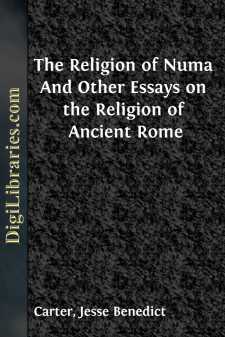Categories
- Antiques & Collectibles 13
- Architecture 36
- Art 48
- Bibles 22
- Biography & Autobiography 813
- Body, Mind & Spirit 142
- Business & Economics 28
- Children's Books 17
- Children's Fiction 14
- Computers 4
- Cooking 94
- Crafts & Hobbies 4
- Drama 346
- Education 46
- Family & Relationships 57
- Fiction 11829
- Games 19
- Gardening 17
- Health & Fitness 34
- History 1377
- House & Home 1
- Humor 147
- Juvenile Fiction 1873
- Juvenile Nonfiction 202
- Language Arts & Disciplines 88
- Law 16
- Literary Collections 686
- Literary Criticism 179
- Mathematics 13
- Medical 41
- Music 40
- Nature 179
- Non-Classifiable 1768
- Performing Arts 7
- Periodicals 1453
- Philosophy 64
- Photography 2
- Poetry 896
- Political Science 203
- Psychology 42
- Reference 154
- Religion 513
- Science 126
- Self-Help 84
- Social Science 81
- Sports & Recreation 34
- Study Aids 3
- Technology & Engineering 59
- Transportation 23
- Travel 463
- True Crime 29
The Religion of Numa And Other Essays on the Religion of Ancient Rome
Description:
Excerpt
THE RELIGION OF NUMA
Rome forms no exception to the general rule that nations, like individuals, grow by contact with the outside world. In the middle of the five centuries of her republic came the Punic wars and the intimate association with Greece which made the last half of her history as a republic so different from the first half; and in the kingdom, which preceded the republic, there was a similar coming of foreign influence, which made the later kingdom with its semi-historical names of the Tarquins and Servius Tullius so different from the earlier kingdom with its altogether legendary Romulus, Numa, Tullus Hostilius and Ancus Martius. We have thus four distinct phases in the history of Roman society, and a corresponding phase of religion in each period; and if we add to this that new social structure which came into being by the reforms of Augustus at the beginning of the empire, together with the religious changes which accompanied it, we shall have the five periods which these five essays try to describe: the period before the Tarquins, that is the "Religion of Numa"; the later kingdom, that is the "Reorganisation of Servius"; the first three centuries of the republic, that is the "Coming of the Sibyl"; the closing centuries of the republic, that is the "Decline of Faith"; and finally the early empire and the "Augustan Renaissance." Like all attempts to cut history into sections these divisions are more or less arbitrary, but their convenience sufficiently justifies their creation. They must be thought of however not as representing independent blocks, arbitrarily arranged in a certain consecutive order, not as five successive religious consciousnesses, but merely as marking the entrance of certain new ideas into the continuous religious consciousness of the Roman people. The history of each of these periods is simply the record of the change which new social conditions produced in that great barometer of society, the religious consciousness of the community. It is in the period of the old kingdom that our story begins.
At first sight it may seem a foolish thing to try to draw a picture of the religious condition of a time about the political history of which we know so little, and it is only right therefore that we should inquire what sources of knowledge we possess.
There was a time, not so very long ago, when under the banner of the new-born science of "Comparative Philology" there gathered together a group of men who thought they held the key to prehistoric history, and that words themselves would tell the story where ancient monuments and literature were silent. It was a great and beautiful thought, and the science which encouraged it has taken its place as a useful and reputable member of the community of sciences, but its pretensions to the throne of the revealer of mysteries have been withdrawn by those who are its most ardent followers, and the "Indo-Germanic religion" which is brought into being is a pleasant thought for an idle hour rather than a foundation and starting-point for the study of ancient religion in general....


